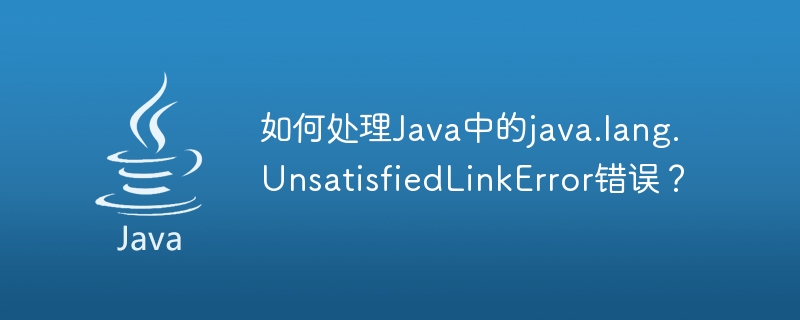

Java.lang.UnsatisfiedLinkError exception occurs at runtime when an attempt is made to access or load a native method or library due to a mismatch between its architecture, operating system, or library path configuration and the referenced one. fail. It usually indicates an incompatibility with the architecture, operating system configuration, or path configuration that prevents success - usually the local libraries referenced do not match those installed on the system and are not available at runtime
To overcome this error, the key is that the native library is compatible with your system and accessible through its library path setting. You should verify that library files exist in their specified locations and meet system requirements.
java.lang.UnsatisfiedLinkError is a runtime exception in Java that occurs when there is a problem linking a native method with a native library. The Java code cannot find or load the native method, causing an error during dynamic linking.
UnsatisfiedLinkError is caused by a variety of factors, such as missing native libraries or incorrectly configured native library paths, outdated library versions, or dependencies required by native code. If these problems prevent Java code from successfully linking with native code, they will cause exceptions
public class UnsatisfiedLinkError extends LinkageError {
// Constructors
public UnsatisfiedLinkError();
public UnsatisfiedLinkError(String message);
public UnsatisfiedLinkError(String message, Throwable cause);
// Additional methods and inherited methods from LinkageError
}
There are several ways to handle java.lang.UnsatisfiedLinkError in Java. Here are some examples:
Exception handling
Verify library path
Check system architecture
In order to handle the UnsatisfiedLinkError error, the code that may trigger the error can be placed in a try-catch block for processing. In order to solve this problem, error handling logic can be implemented in catch. If the problem is not resolved, you can log it, display a clear error message, or perform other steps
To diagnose the root cause of UnsatisfiedLinkError, analyze the error message and corresponding stack trace. These details provide information about potential issues such as missing or incompatible libraries, incorrect paths to libraries, and missing dependencies
Start a try block to include code that may trigger UnsatisfiedLinkError
Execute code that may cause errors in a try block.
Start the catch block with the appropriate exception type (UnsatisfiedLinkError) as parameter
In the catch block, use error handling logic. This may include logging an error message, displaying the error to the end user, or performing alternative actions
Analyze the error message and stack trace to determine the root cause of UnsatisfiedLinkError. This information may provide insights into missing or incompatible native libraries. It can also reveal incorrect library paths and missing dependencies.
Resolve the root cause of the error. Make sure all required native libraries are installed and configured correctly. Verify and correct library paths. Update library version
public class NativeLibraryLoader {
public static void main(String[] args) {
try {
// Load the native library
System.loadLibrary("myLibrary");
// Call a native method
executeNativeMethod();
} catch (UnsatisfiedLinkError error) {
// Handle the exception
System.out.println("Failed to load the native library: " + error.getMessage());
// Take appropriate action, such as providing an alternative implementation or terminating the program
}
}
// Native method declaration
public static native void executeNativeMethod();
}
Failed to load the native library: myLibrary.dll: The specified module could not be found.
First, start by identifying and locating the exact native library that is causing the error. The error message will provide this information. Check the location of the native library on your system to make sure it exists.
Make sure your local library path is defined correctly. If the library path is not set, it can be defined explicitly using System.setProperty("java.library.path", "/path/to/library"), where the actual path is the path to the directory containing the local library
This approach allows you to verify that the library path is correct and that the local library is accessible before trying to load the file. It helps you handle UnsatisfiedLinkError and take appropriate action based on its results.
To determine which native library is causing the problem, first carefully examine its accompanying error message
The directory containing the native library needs to be added to the configured library path so that the system can accurately find and load it. Completing this step ensures that the library is loaded correctly
After verifying or updating the library path, execute the application and check if the UnsatisfiedLinkError issue has been resolved.
public class LibraryPathVerifier {
public static void main(String[] args) {
String customLibraryPath = "/path/to/native/library";
// Set the custom library path
System.setProperty("java.library.path", customLibraryPath);
try {
// Verify library availability by attempting to load the native library
System.loadLibrary("myLibrary");
System.out.println("Native library loaded successfully.");
} catch (UnsatisfiedLinkError error) {
// Handle the exception
System.out.println("Failed to load the native library: " + error.getMessage());
// Take appropriate action, such as providing an alternative implementation or terminating the program
}
}
}
Failed to load the native library: no myLibrary in java.library.path
First you need to determine the system architecture on which the Java application is executing. Determining whether it is 32-bit or 64-bit is crucial to ensure compatibility.
The system architecture should match the native library being loaded. Failure to do this may result in an UnsatisfiedLinkError exception, which indicates that the library has been compiled for a different architecture.
考虑系统架构并确保本地库与目标环境的兼容性,可以有效处理UnsatisfiedLinkError并确保本地库成功加载
确定目标机器的系统架构。
需要在库路径或类路径中包含包含适当本地库版本的目录。
运行Java应用程序
public class SystemArchitectureChecker {
public static void main(String[] args) {
String baseLibraryName = "myLibrary";
String libraryName;
// Determine the appropriate library name based on the system architecture
if (System.getProperty("os.arch").contains("64")) {
libraryName = baseLibraryName + "_64";
} else {
libraryName = baseLibraryName + "_32";
}
try {
// Load the native library
System.loadLibrary(libraryName);
System.out.println("Native library loaded successfully.");
} catch (UnsatisfiedLinkError error) {
// Handle the exception
System.out.println("Failed to load the native library: " + error.getMessage());
// Take appropriate action, such as providing an alternative implementation or terminating the program
}
}
}
Failed to load the native library: no myLibrary_64 in java.library.path
在Java中使用本地库时,遇到java.lang.UnsatisfiedLinkError是常见的。它在运行时无法正确加载或链接本地库时发生。然而,开发人员可以通过使用异常处理和验证库路径或系统架构来管理此错误。异常处理确保了优雅的错误处理,并提供相关的错误消息,同时记录详细信息以供将来参考
The above is the detailed content of How to handle java.lang.UnsatisfiedLinkError error in Java?. For more information, please follow other related articles on the PHP Chinese website!
